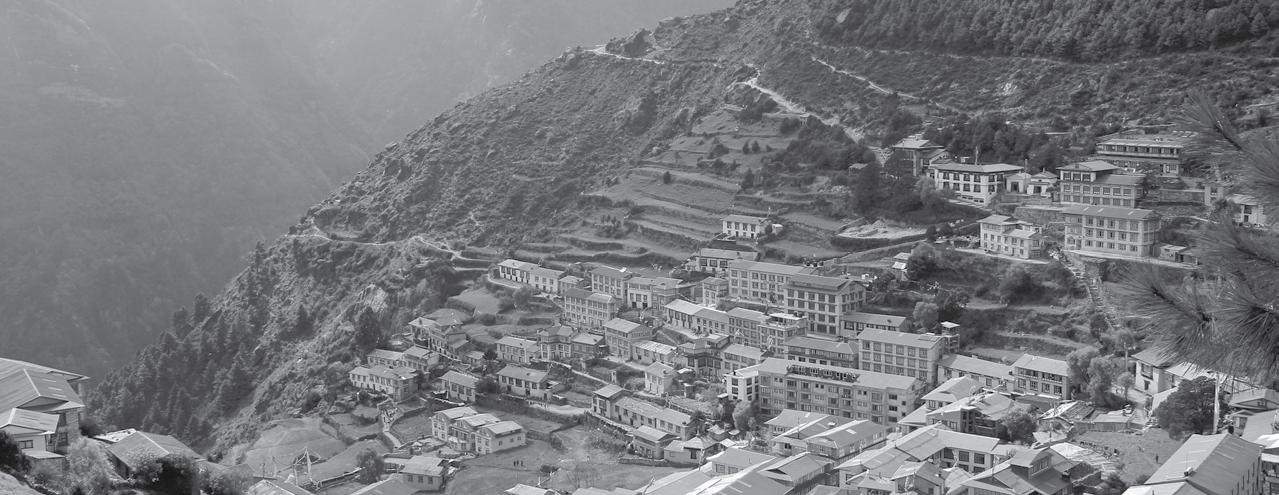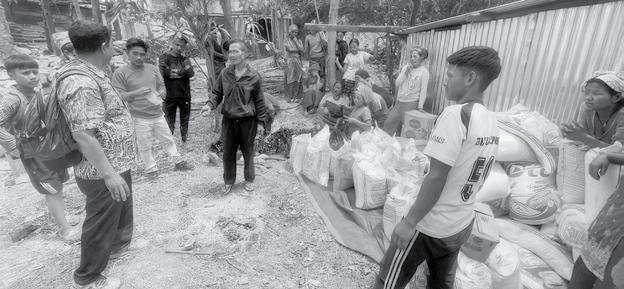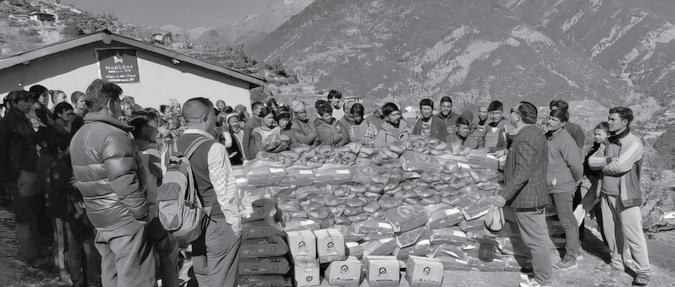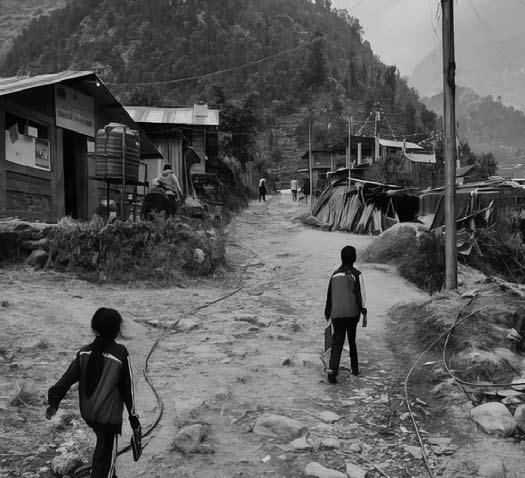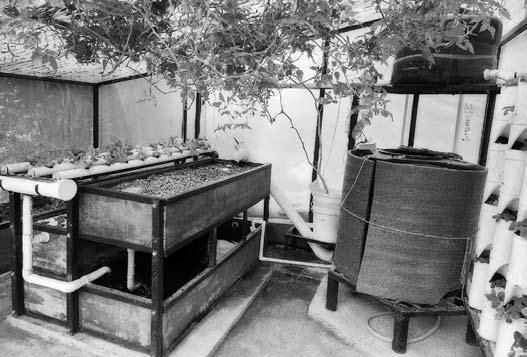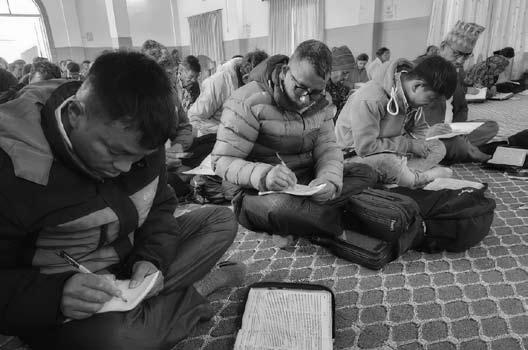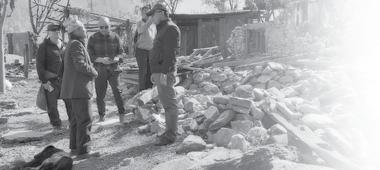城北堂和平福音事工之
尼泊爾事工
尼泊爾和平項目(2024--2028 年)
2024年是尼泊爾 PEACE 項目的啟動年。城北華基 通過華基聯會向尼泊爾 PEACE 項目承諾了未來5年的資 源。 PEACE 項目是一個全球性的整體任務計劃,其首字母 縮寫「PEACE」:
P - 建立教會,讓未得之民認識耶穌。
E - 通過持續的門徒培訓和靈性成長,培養僕人式領導 者。
A - 幫助窮人、弱勢群體以及因自然災害而陷入經濟困境 的人。
C - 關愛病人,通過社區健康教育,需要醫療照顧的人提 供資源。
E- 教育下一代。
那麼,我們如何在尼泊爾實施PEACE計劃呢? 建立教會和傳福音
2024年2月,我們的主領牧者(崔皓明牧師)和宣教 牧者(許思凡傳道)與尼泊爾中華基督教會的團隊一起前 往尼泊爾進行實地探訪。我們首先舉行了為期兩天的會 議,向尼泊爾的兩個當地教會夥伴傳遞異象。大約一百位 牧師和教會領袖參加了會議。在合作教會的幫助下,我們 為這個項目招募了14名尼泊爾宣教士。
僕人式領導者提供裝備
宣教士們在PEACE大會期間接受委托,被派往十二 個城鎮和村莊。他們是「和平使者」,其使命是在被派往 的社區裡傳揚耶穌。
我們為宣教士配備了數字設備,以便可以定期從大本 營遙距開展門徒培訓和輔導。通過遙距培訓,他們分享了 自己的見證和挑戰。在為彼此禱告的同時,我們也將他們 的擔憂托付給主。他們並非都能說流利的英語,但感謝神 為我們提供了翻譯。
幫助窮人
緊急地震救援:2023年11月5日,尼泊爾西部省份一 個偏遠地區賈賈科特( Jajarkot )發生了5.7級地震,導致
150 多人喪生,多人受傷,數千人失去家園。這個鮮為人 知的地方的居民所遭受的苦難卻不止於此:因為他們並不 在許多國際組織和新聞機構所關注的範圍內,雖然遭受了 災難,卻苦於無人提供援助。凜冬將至,城北華基立即啟 動了一項救援計劃,以幫助這些弱勢群體。三個救援計劃 在不同的時間被執行。總共有550個家庭接受了食品分發 計劃,這些食品幫助他們度過了寒冬。政府已批准100戶 家庭提供建築材料,這將用於修復被地震毀壞的家園。
有兩位哺乳期的母親帶著她們的幼兒前來申領物資。 可她們來晚了,當發現登記表上沒有她們的名字時,不由
得彷徨失措。感謝神!祂沒有忘記那些有需要的人。最後兩袋大 米給了她們。這是因為有些村民只拿走了毯子,卻把大米留給了她 們。兩位母親歡天喜地地走了:一位母親抱著兩個蹣跚學步的孩 子;另一位母親則帶著兩袋大米。因為 「我的神必照他榮耀的豐 富,在基督耶穌裡,使你們一切所需用的都充足。(腓4:19 )」
在二月份的「家庭自願信托」活動結束幾個月後,我們向 Kesap 牧師所在的村莊送去了食品。他非常感激上帝帶領我們來到 他所在的那個鮮為人知的村莊,並記住了他們的需求。
長期可持續項目
尼泊爾人口眾多,生活貧困,失業率極高。尼泊爾有3000萬 人口,550 多萬尼泊爾人在國外就業,通常從事低薪工作。作為外 籍工人,他們經常受到剝削,與家人分離,收入微薄。
從長遠來看,「尼泊爾和平項目計劃」在夥伴教會的幫助 下,在我們的宣教士服事的地區實施水栽和魚菜共生系統。尼泊爾 75%的土地為山地,肥沃的平原很少,而且通常為富有的地主所擁 有。窮人通常淪為地主的僱工,甚至遠赴印度的農場工作。即使有 些農民擁有自己的土地,他們的小塊土地也只能在9個月的生長季 節中維持6個月。因此,他們不得不在印度從事農活或體力勞動。 「水培系統」需要的地塊面積較小,很容易在尼泊爾山上的梯田中 種植。這裡到處都有充足的水源、陽光和人力。該系統的設計是模 塊化的,易於組裝和複製。我們的計劃是使其成為一個可持續發展 的社會企業;我們將提供啟動該項目的啟動資金,使該企業最終能 夠自力更生,在未來為這些部委提供支持。(插圖是一個典型的小 型魚菜共生系統)
照顧病人
我們將對宣教士進行社區健康佈道方面的培訓。我們再次看 到這是神的旨意。祂將對宣教士進行社區健康方面的培訓,而宣教 士也將把這些寶貴的知識傳授給各自的社區。這將使村民過上健康 的生活,同時也是向他們宣傳耶穌的機會。健康和有益健康的生活 方式可以減少生病的風險。
教育下一代
我們開辦了一家宿舍名為 ShantiGhira ,意為「和平之家」。 這是為來自人口販運猖獗地區的貧困少女提供的宿舍。她們的家庭 住在偏遠的山區,步行上學單程就要兩個小時,因此,許多少女缺 乏基礎教育,年紀輕輕就淪為妓女。宿舍由我們的宣教士管理,她 們將有機會聽到福音。學校距離宿舍只有半小時的步行路程,隔壁 就是當地的教堂。這真是上帝的旨意。
NEPAL PEACE PROJECT (2024-2028)
2024 is the inauguration for the Nepal PEACE Project. RHCCC, through ACEM has committed resources for the next 5 years to the Nepal PEACE project. PEACE project is a global and wholistic mission plan following the acronym:
P – plant churches and make Jesus known to unreached people group.
E – equip servant leaders through continue discipleship training and spiritual growth.
A – assist the poor, the less privileged, and those in financial plights caused by natural calamities.
C – care for the sick, through community health education, providing resources for those who needs medical attention.
E – education for the next generation.
So how do we implement PEACE in Nepal?
Church Plant and Evangelism – In February 2024, our Lead Pastor (Pastor Ho-Ming) and Mission Pastor (Pastor Stephen Hsu) together with the team from RHCCC made a Field Visitation Trip to Nepal. We started with a two day conference and cast the vision to two local church partners in Nepal. About one hundred pastors and church leaders attended the conference. With the help of partnering churches, we recruited 14 Nepalese missionaries for this project.
Equipping the servant leaders
The missionaries were commissioned during the PEACE Conference and sent off to twelve towns and villages. These are the “person of PEACE” and their calling is to made Jesus known in their communities.
We have equipped the missionaries with digital devices so we can conduct regular discipleship training and coaching remotely from our home base. Through remote training, they shared their testimonies and challenges. We lift their concerns to the Lord as we prayed for one another. Not all of them are fluent in English, therefore God provided us with interpreters.
Assist the Poor
Urgent Earthquake Relief – On November 5th 2023, an earthquake of 5.7 magnitude struck Jajarkot, a remote district in the western province of Nepal. Over 150 lost their lives, many more sustained injuries and several thousands lost their homes. This is a lesser-known place, and but their suffering are no lesser. Because they are not in the radar of many international organizations and news agencies. They suffered without help. With winter fast approaching, RHCCC dispatched an immediate rescue plan to help the less privileged. Three relief programs were sent off at different times. In total, 550 families received the food distribution program which had sustained them through the winter months. The government has given the approval to supply building materials for one hundred families. This will go towards repairing the damages caused by the earthquake.
Two nursing mothers with their toddlers came begging for the supplies. They came late and panicked when they found that their names were not in the registry. God did not forget those with needs. The last two bags of rice were given to them. This provision came because there were villagers that only took the
blankets leaving the bags of rice for them. The two mothers went away with joy, one carrying two toddlers and the other mother with two bags of rice. For my God shall supply all their needs according to His glorious riches that is in Christ Jesus. Philippians 4:19
A months after our February FVT, we sent food supply to Pastor Kesap’s village. He was grateful that God led us to his lesser known village and remember their needs.
Long term sustainable project
A large population in Nepal live in poverty with an extremely high unemployment rate. Nepal has a population of 30 million, and more than 5.5 million Nepalese take up employment outside of their own country, usually in low paying jobs. As foreign workers they are often exploited and separated from their families, while earning a paltry income.
For the long term, the Nepal PEACE Project envisage with the help of partner churches to implement hydroponics and aquaponics system in the area where our missionaries are serving. 75 % of the land in Nepal is covered by mountain. Good fertile flat land is scarce and often owned by wealthy landowners. The poor usually ends up as farm labourers for the landowners and travel as far as India to work on farms. Even if some farmers have their own land, their small plots will sustain them for 6 months out of the 9 months growing season. Hence, they resort to working in India as farm-hand or manual labourers. Hydroponics system needs a small plot size that easily fits in the terraced plots on the mountain in Nepal. There is a good supply of water, sunlight, and human effort everywhere. The system design is modular, easily assembled and replicated. The plan to make this a sustainable social enterprise; we will provide the initial capital to start up the project so that eventually, this enterprise will be able sustain on its own and support these ministries in the future. Insert is a typical small scale aquaponics system.
Care for the Sick
We will train our missionaries in community health evangelism. Again, we saw this as a providence of God. Through the connection with a partnering church, God sent us a Nepali trainer representing CHE (Community Healthy Evangelism.) He will train the missionaries in Community Health, and they will in turn transfer such valuable knowledge to their respective communities. This will enable the villagers to live in a healthy lifestyle and at the same time an opportunity the make Jesus known to them. Living healthy and wholesome lifestyles reduces risks of sickness.
Educate the Next Generation
We have started a hostel, called “Shanti Ghira” meaning “PEACE Home.” It is a hostel for the less privileged teenage girls from a district where human trafficking is rampant. Their families live in remote mountain area, and it can two hours each way for them to walk to school as such, many of the teenage girls lack basic education and ended up working in the sex trade as prostitutes. at a very young age. The hostel is supervised by our missionaries, and they will have to opportunity to hear the gospel. The school is only a half hour walk from the hostel and a local church is next door. This again is truly God’s providence.
